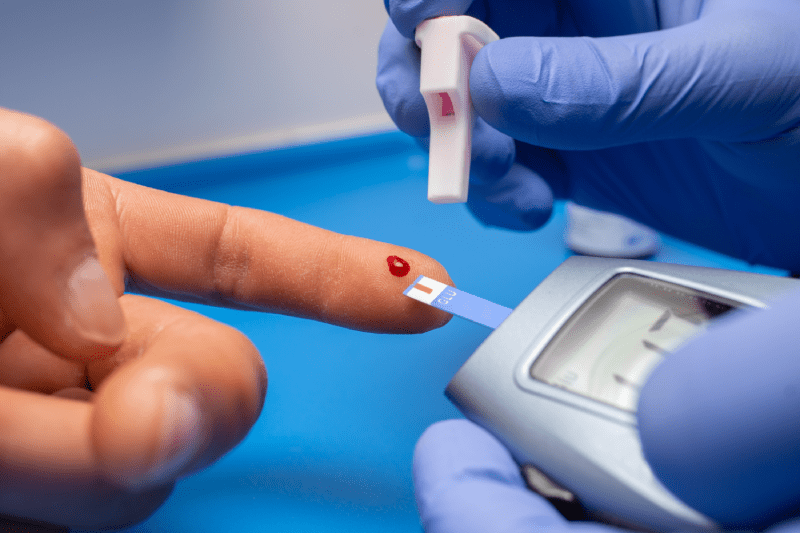What is the Main Problem of Untreated Type 1 Diabetes?
The fundamental problem that untreated type 1 diabetes causes in the body is the pancreas’s inability to produce sufficient or any insulin. Insulin is a hormone that allows the body’s cells to use blood sugar (glucose) for energy. In the absence of insulin, blood sugar cannot enter the cells and accumulates in the bloodstream, reaching dangerously high levels.
This not only causes the cells to starve for energy but also, over time, high blood sugar causes irreversible damage to all the blood vessels and nerve cells in the body. This destruction affects vital organs such as the heart, kidneys, eyes, and nerves, leading to serious and permanent complications in the long run. For this reason, type 1 diabetes is a chronic disease that requires continuous and lifelong insulin treatment.
Why Does Type 1 Diabetes Require Emergency Intervention?
Untreated type 1 diabetes can cause life-threatening conditions in the short term. When the body’s cells cannot use glucose for energy, they turn to an alternative energy source: fat tissue. As a result of fat burning, acidic substances called ketones are produced. These ketones accumulate in the bloodstream, disrupting the blood’s pH balance and making the blood overly acidic.
This condition is known as diabetic ketoacidosis (DKA) and requires immediate medical intervention. Symptoms include excessive thirst, frequent urination, abdominal pain, nausea, vomiting, and rapid breathing. If DKA is not treated quickly, it can lead to a coma and even death. Therefore, it is of vital importance to start insulin treatment immediately in individuals diagnosed with type 1 diabetes.
What is Diabetic Ketoacidosis (DKA) and How Does It Develop?
Diabetic ketoacidosis (DKA) is a life-threatening condition characterized by the accumulation of acidic ketone substances in the blood, which form as a result of the body starting to burn fat for energy due to insulin deficiency. Normally, cells need insulin to use glucose for energy. When a person with type 1 diabetes has no insulin, the cells starve, and the body begins to break down fats to get energy.
This breakdown process produces ketones that make the blood acidic. Symptoms can develop quickly; these include severe thirst, frequent urination, nausea, vomiting, abdominal pain, mental confusion, and a fruity-smelling breath. If left untreated, DKA can lead to brain swelling (edema), coma, and death. This condition is one of the most dangerous complications that every person with type 1 diabetes needs to be aware of and requires immediate insulin treatment with electrolyte and fluid replacement.

What is the Effect of Insulin Deficiency on Body Cells?
Insulin is a key that opens the doors of the body’s cells, allowing glucose to enter. In type 1 diabetes, this key is completely missing. Due to the lack of insulin, glucose in the bloodstream cannot enter the cells, and the cells cannot get the fuel they need for energy. This leads to the body’s cells being unable to perform their functions. The energy-starved cells begin to break down muscle and fat tissue, looking for alternative energy sources. This process leads to muscle loss, weight loss, and most importantly, the production of ketones that make the blood acidic. Untreated insulin deficiency can quickly become life-threatening by impairing the functioning of all organ systems.
What Are the Long-Term Effects of Diabetes on the Eyes?
High blood sugar can damage even the smallest blood vessels in the eyes, which leads to a serious eye disease called diabetic retinopathy. Retinopathy may not be noticed at first, but as it progresses, the blood vessels in the retina start to leak, get blocked, or form new, fragile, and abnormal blood vessels. This can cause bleeding inside the eye and lead to blurred vision.
If left untreated, retinopathy can lead to permanent vision loss and blindness. In addition, diabetes also increases the risk of cataracts (clouding of the eye’s lens) and glaucoma (increased pressure inside the eye). Therefore, it is of vital importance for patients with type 1 diabetes to have regular eye examinations.
How Can Diabetic Retinopathy Lead to Blindness?
Diabetic retinopathy begins with damage to the small blood vessels in the retina at the back of the eye due to high blood sugar. In the early stage, these vessels leak fluid and cause the retina to swell. As the disease progresses, the damaged vessels become blocked, and the retina cannot get enough oxygen. In response, the body forms new, but weak and fragile, blood vessels. These new vessels can bleed easily and cause bleeding inside the eye, which blurs vision and causes spots to be seen. These bleeds can recur and cause the retina to detach. All these processes can lead to permanent vision loss and ultimately blindness.
What Are the Destructive Effects of Diabetes on the Kidneys?
Diabetic nephropathy is a serious kidney disease that occurs when high blood sugar damages the small blood vessels in the kidneys. The kidneys are responsible for filtering the blood and removing waste products from the body. Due to diabetic damage, this filtering system is impaired.
It initially manifests itself with protein leakage in the urine and can lead to kidney failure as it progresses. Untreated diabetes can lead to end-stage renal disease, which requires dialysis or a kidney transplant. Therefore, blood sugar and blood pressure control are of critical importance for protecting kidney health, and every individual with diabetes must have regular kidney function tests.
How Does Diabetic Nephropathy Develop and What Are Its Symptoms?
Diabetic nephropathy develops slowly as the small blood vessels in the glomeruli, the kidney’s filtering unit, are damaged by high blood sugar. In the early stage, the kidneys do not show symptoms despite being damaged. This condition can be detected by the presence of a very small amount of protein (microalbuminuria) in the urine, which should not normally be there. As the disease progresses, the amount of protein in the urine increases, and the kidneys lose their ability to remove waste products from the body. In advanced stages, symptoms include swelling (edema) in the legs, feet, and hands, loss of appetite, fatigue, nausea, and itching. When these symptoms appear, kidney damage is usually at an advanced stage.
What Are the Effects of Diabetes on Heart and Vascular Health?
High blood sugar causes inflammation and damage to the walls of the arteries, which increases the risk of atherosclerosis (hardening of the arteries). In individuals with diabetes, blood vessels harden and narrow faster. This significantly increases the risk of heart attack and stroke.
In addition, diabetes also brings with it other heart disease risk factors such as high blood pressure and high cholesterol. Untreated diabetes can lead to the weakening of the heart muscle and heart failure. Research shows that diabetes more than doubles the risk of heart disease compared to normal individuals. Therefore, diabetes management is of critical importance for protecting heart health and requires a lifelong effort to reduce cardiovascular risk.
What is Diabetic Neuropathy and How Does It Affect the Nervous System?
Diabetic neuropathy is nerve damage caused by high blood sugar levels. This condition usually affects the nerves in the hands and feet, which is why patients experience symptoms such as tingling, numbness, burning, or severe pain. Over time, this feeling of numbness can lead to the formation of sores on the feet that go unnoticed, increasing the risk of infection.
It can also affect the autonomic nervous system, causing broader health problems such as digestive issues (gastroparesis), bladder problems, erectile dysfunction, and uncontrolled blood pressure. Diabetic neuropathy can be painful and uncomfortable, as well as severely reduce the patient’s quality of life and make daily activities difficult.
How Does Diabetic Foot Syndrome Occur and Why is It Dangerous?
Diabetic foot syndrome is a result of nerve and blood vessel damage in the feet due to high blood sugar. Nerve damage (neuropathy) leads to a loss of sensation in the feet, so small injuries, cuts, or blisters are not felt or noticed. Damage to blood vessels (angiopathy) slows down the healing process of wounds. When these two factors combine, even a small wound can quickly become infected and turn into gangrene. If the infection is not brought under control, amputation may become necessary to prevent limb loss. For diabetic patients, regular foot care, appropriate shoe selection, and daily check-ups are of vital importance to minimize this risk.
What Are the Effects of Diabetes on the Digestive System?
Untreated diabetes can cause serious problems in the digestive system by damaging the autonomic nervous system. This can lead to a complication known as gastroparesis. Gastroparesis is the stomach’s decreased ability to empty food into the small intestine. Symptoms include nausea, vomiting, a feeling of early fullness, bloating, and heartburn. This condition affects nutrient absorption and can cause unpredictable fluctuations in blood sugar levels. If left untreated, this can lead to nutritional deficiencies and a severe decline in quality of life, and it requires complex management.

What Are the Negative Effects of Diabetes on Oral and Dental Health?
High blood sugar promotes bacterial growth in the mouth, which significantly increases the risk of gum diseases. Gingivitis and periodontitis (infection of the tissues surrounding the teeth) are more common and more severe in diabetic patients. Gum diseases can make blood sugar control even more difficult, creating a vicious cycle. In addition, diabetes can also cause dry mouth, which in turn leads to an increase in tooth decay. Therefore, it is necessary for diabetic patients to have regular dental check-ups and to pay special attention to oral hygiene. The treatment of periodontal diseases also positively affects diabetes management.
What Are the Effects of Diabetes on Skin Health?
Untreated diabetes can lead to various skin problems. High blood sugar increases the risk of skin infections, which causes frequent occurrences of bacterial and fungal infections (especially in moist areas such as the feet, groin, and armpits). Diabetes can also lead to a condition known as acanthosis nigricans, characterized by the darkening and thickening of the skin in areas such as the neck and armpits. Diabetic ulcers and slow-healing wounds are also a major problem. Therefore, diabetic patients need to regularly check their skin and be careful even with the slightest injury.
What Are the Effects of Diabetes on the Immune System?
High blood sugar weakens the function of the body’s immune system cells and reduces its ability to fight infections. Individuals with untreated diabetes are more vulnerable to infections, especially urinary tract infections, skin infections, and pneumonia. Infections can further increase blood sugar levels, making the condition worse. Therefore, it is necessary for diabetic patients to be careful about the symptoms of infection and to consult a doctor even with the slightest symptom. It is of vital importance to keep blood sugar under control for a strong immune system.
What Are the Effects of Diabetes on Psychological Health?
Diabetes is not just a physical illness but also a condition with serious psychological effects. The diagnosis of type 1 diabetes, which requires lifelong management, increases the risk of anxiety, stress, and depression. The continuous blood sugar monitoring, injections, and lifestyle changes brought about by a chronic illness can make patients feel overwhelmed and isolated. This can make diabetes management even more difficult, as patients may give up on taking their medication regularly, eating healthy, and exercising. Therefore, getting psychological support as part of diabetes management is of vital importance.
What Are the Effects of Diabetes on Sexual Health?
Untreated diabetes can cause sexual health problems in both men and women. In men, diabetes can lead to nerve and vascular damage, which significantly increases the risk of erectile dysfunction (erection problems). In women, nerve damage can cause vaginal dryness, lack of sexual desire, and orgasm problems. These conditions can have negative effects on relationships and decrease the quality of life. Maintaining blood sugar control can help reduce the risk of such sexual health problems and contribute to the improvement of sexual functions.
What is Diabetic Coma and Why Does It Develop?
Diabetic coma is a state of unconsciousness that occurs when blood sugar reaches very high (hyperglycemia) or very low (hypoglycemia) levels. The most common type of coma in type 1 diabetics is diabetic ketoacidosis (DKA) coma. The absence of insulin causes the body to burn fat for energy and makes the blood acidic, which can lead to a coma. Similarly, a dangerous drop in blood sugar (hypoglycemia) due to an excessive insulin injection or insufficient food intake can also lead to a coma. Both conditions require immediate medical intervention and can be fatal if left untreated. Therefore, it is very important to regularly check blood sugar and recognize the symptoms.
What is the Effect of Diabetes on Urinary Tract Infections?
High blood sugar causes an increase in the sugar level in the urine, which creates an ideal environment for bacterial growth. As a result, urinary tract infections (UTIs) are more common in individuals with diabetes. If these infections are left untreated, they can spread to the kidneys and lead to more serious health problems. In addition, diabetic neuropathy can affect bladder function, causing urine to remain in the bladder, which further increases the risk of bacterial growth. Therefore, it is important for diabetic patients to consume enough fluids and to be careful about the symptoms of urinary tract infections.
What Is The Effect Of Diabetes On Mental And Cognitive Functions?
High blood sugar levels can negatively affect cognitive functions by damaging the blood vessels in the brain. Untreated diabetes has been shown to cause impairments in memory, learning, and decision-making abilities. Research shows that type 1 diabetes increases the risk of dementia and Alzheimer’s disease. Fluctuations in blood sugar levels directly affect brain functions and can cause difficulty in concentration and fatigue. Keeping blood sugar under control is a critical step to protect brain health and slow cognitive decline.
What Are The Effects Of Diabetes On Joint Health?
Untreated diabetes can cause problems in joint and muscle tissues. High blood sugar can lead to joint stiffness and a decrease in mobility. This can lead to the emergence of conditions such as frozen shoulder. In addition, diabetes can affect tendons and connective tissue, increasing the risk of nerve compression problems such as carpal tunnel syndrome. The accumulation of sugar in the joint fluid can lead to joint stiffness and pain. Therefore, it is important for diabetic patients to maintain joint mobility by exercising regularly.
What Are The Effects Of Diabetes On Blood Clotting?
High blood sugar can affect the blood clotting system, causing the blood to clot more easily. This increases the risk of clot formation (thrombosis) within the blood vessels. Clots that form can lead to a heart attack when they block blood vessels in the heart, and a stroke when they block blood vessels in the brain. The vascular damage caused by diabetes further increases this risk. Therefore, anticoagulant treatment (blood thinners) may be necessary in individuals with diabetes. Blood sugar control plays an important role in reducing this risk.
What Are The Effects Of Diabetes On Reproductive Health?
Untreated diabetes can lead to reproductive health problems in both men and women. In women, hormonal imbalances increase the risk of menstrual irregularities and polycystic ovary syndrome (PCOS), which can make it difficult to get pregnant. In men, high blood sugar levels can negatively affect sperm quality and quantity. In addition, diabetes carries serious risks for both the mother and the baby during pregnancy. Uncontrolled diabetes increases the risk of miscarriage, premature birth, and developmental disorders in the baby.
What Are The Effects Of Diabetes On Hair And Nail Health?
Diabetes can also negatively affect hair and nail health. High blood sugar prevents sufficient blood and nutrients from reaching the hair follicles and nails. This can cause hair to become weak, brittle, and fall out. In nails, brittleness, color changes, and fungal infections can be seen more frequently. Thyroid problems are also more common in individuals with diabetes, which can also trigger hair loss. To protect hair and nail health, it is important to keep blood sugar levels under control, eat a balanced diet, and take necessary vitamin supplements.
What Are The Effects Of Diabetes On Body Weight?
At the onset of type 1 diabetes, there is a sudden and significant weight loss because the body burns muscle and fat tissue for energy. However, untreated diabetes can lead to serious and unhealthy weight loss in the long run. This is a result of the body being in a constant state of hunger and energy deficit. When insulin treatment is started, weight gain can normalize because the body can use glucose for energy. However, hormonal imbalances and poor eating habits brought about by diabetes can also increase the risk of obesity.
What Are The Effects Of Diabetes On Hearing Loss?
High blood sugar can damage the small blood vessels and nerves in the ears, which can lead to hearing loss. Research shows that individuals with diabetes have a higher risk of hearing loss. Therefore, it is important for diabetic patients to keep their blood sugar levels under control and to be careful about the symptoms of hearing loss. Early diagnosis can play a key role in slowing the progression of hearing loss.
What Are The Effects Of Diabetes On Heart Failure?
Untreated diabetes weakens the heart muscle and increases the risk of heart failure. High blood sugar and high blood pressure put an extra burden on the heart muscle and, over time, reduce the heart’s ability to pump blood effectively. This can lead to symptoms such as fatigue, shortness of breath, and swelling in the legs. Diabetes management is of vital importance to reduce the risk of heart failure. The vascular damage caused by diabetes also makes it more difficult for the heart to get oxygen, which increases the risk of heart failure.
What Are The Effects Of Diabetes On Gingivitis And Tooth Loss?
High blood sugar can cause gingivitis and a more serious gum disease called periodontitis. Diabetes promotes the growth of bacteria in the mouth, which leads to inflammation in the gum tissues. Uncontrolled periodontitis can cause tooth loss by making the teeth lose their bone support. In addition, gingivitis makes blood sugar control even more difficult. Therefore, regular dental check-ups and a good oral hygiene routine are important.
What Are The Effects Of Diabetes On The Circulatory System?
Untreated diabetes damages blood vessels, leading to circulatory system problems. The hardening and narrowing of the blood vessels (atherosclerosis) restrict blood flow. This can lead to symptoms such as coldness, numbness, and pain in the hands and feet. In severe cases, a complete cutoff of blood flow can cause gangrene and limb loss. In addition to blood sugar control, regular exercise is also important for protecting the circulatory system.
What Are The Effects Of Diabetes On Muscle Weakness?
High blood sugar makes it difficult for muscle cells to use glucose for energy, which can lead to muscle weakness and fatigue. Diabetic neuropathy further increases muscle weakness by damaging the nerves that control muscles. Untreated diabetes can also lead to a decrease in muscle mass by impairing protein synthesis. Regular exercise and a healthy diet can help preserve muscle mass and reduce weakness.
What Are The Effects Of Diabetes On Shoulder Pain And Stiffness?
Shoulder stiffness and pain (frozen shoulder) are common complications in individuals with diabetes. High blood sugar causes the tissues around the shoulder joint to harden and lose their flexibility. This makes it difficult to move the arm and causes pain. Diabetes management and regular exercise can help maintain shoulder mobility. This kind of pain may require physical therapy.
What Is The Effect Of Diabetes On Life Expectancy?
Untreated diabetes can significantly shorten life expectancy. Heart disease, stroke, kidney failure, and other complications can lead to premature death. In particular, type 1 diabetes can be fatal within a few years without insulin treatment. However, with modern insulin treatments and an effective management plan, individuals with type 1 diabetes have a very high chance of living a normal lifespan. The effective management of diabetes significantly reduces these risks and improves quality of life.
What Are The Skin Spots Caused By Diabetes?
Untreated diabetes can cause brown or purple spots to form on the skin. These spots are usually seen on the lower legs and are known as diabetic dermopathy. This condition is caused by damage to the small blood vessels. In addition, the darkening and thickening of the skin in areas such as the neck and armpits (acanthosis nigricans) can also be seen. These conditions are usually associated with insulin resistance and can improve when blood sugar is brought under control.

What Are The Effects Of Diabetes On Blood Sugar Imbalance?
One of the most prominent features of type 1 diabetes is the sudden and dangerous fluctuations in blood sugar levels. Due to insufficient insulin, blood sugar can become very high (hyperglycemia) or, due to excessive insulin or insufficient carbohydrate intake, it can become very low (hypoglycemia). These imbalances can lead to fatigue, dizziness, mental confusion, and even fainting. These frequent fluctuations can accelerate nerve and organ damage in the long run. An effective management and the right dose of insulin are of vital importance to control these fluctuations.
What Are The Consequences Of Diabetes Weakening The Immune System?
Diabetes prevents the immune system from functioning properly, making the body more vulnerable to infections. High blood sugar impairs the function of white blood cells that fight infections. This causes simple cuts, wounds, or urinary tract infections to become infected more easily and heal more difficultly in individuals with diabetes. Untreated infections can further increase blood sugar levels, making the situation even more complex. This vicious cycle can lead to serious health problems.
What Is The Effect Of Diabetes On The Post-Surgical Healing Process?
The post-surgical healing process for individuals with diabetes can be longer and more complicated. High blood sugar damages blood vessels, preventing sufficient blood flow to the surgical area, which slows down wound healing. In addition, the risk of infection is higher. Therefore, it is of vital importance to keep blood sugar under tight control before and after surgery. Diabetes management before surgical intervention is a critical step to minimize the risk of complications.
What Is The Effect Of Diabetes On Calluses And Swelling In The Feet?
Diabetes causes a loss of sensation due to nerve damage (neuropathy) in the feet. This can accelerate the formation of calluses in areas of the feet that are exposed to pressure. In addition, vascular damage can cause swelling and circulatory disorders in the feet. Diabetic foot care and choosing appropriate shoes are of critical importance for preventing these problems. Regular foot check-ups are essential to prevent a small problem from turning into a serious complication.
What Are The Effects Of Diabetes On Muscle Weakness And Fatigue?
High blood sugar makes it difficult for muscle cells to use glucose for energy, which can lead to muscle weakness and chronic fatigue. Diabetic neuropathy further increases muscle weakness by damaging the nerves that control muscles. Since untreated diabetes leads the body to be in a constant energy deficit, patients may feel too tired to even do daily activities. Regular exercise and a healthy diet can help preserve muscle mass and reduce weakness.
What Is The Effect Of Diabetes On Quality Of Life?
Untreated diabetes significantly reduces the quality of life. Factors such as constant blood sugar fluctuations, chronic fatigue, nerve pain, vision problems, and psychological stress negatively affect daily life. The complications brought about by diabetes can cause patients to withdraw from social life, decrease their work productivity, and reduce their overall life satisfaction. However, with an effective management and treatment plan, individuals with diabetes can have a normal quality of life.
What Is The Effect Of Diabetes On Mental Clarity?
Constant fluctuations in blood sugar prevent the brain from functioning properly. High blood sugar can reduce blood flow to the brain and negatively affect cognitive functions. Low blood sugar can cause confusion, difficulty concentrating, and anxiety because the brain does not get enough glucose. These conditions impair mental clarity, making daily tasks difficult and reducing the quality of life. Keeping blood sugar in balance is of vital importance to maintain mental performance.
What Is The Effect Of Diabetes On The Risk Of Heart Attack?
Diabetes more than doubles the risk of heart attack. High blood sugar accelerates the formation of plaque on the walls of blood vessels, which leads to hardening of the arteries (atherosclerosis). These plaques can grow over time, narrowing the vessels and restricting blood flow. If a plaque ruptures, it can trigger the formation of a blood clot, and this clot can cause a heart attack when it blocks a blood vessel in the heart. Managing diabetes is one of the most important steps to reduce this risk.
What Are The Effects Of Diabetes On Body Temperature Regulation?
Diabetes can affect the regulation of body temperature by damaging the autonomic nervous system. This can cause patients to sweat excessively or not be able to sweat. High blood sugar can also reduce the skin’s moisture and elasticity, which makes heat transfer difficult. As a result, individuals with diabetes may become more sensitive to heat, and the risk of heatstroke increases.
What Is The Effect Of Diabetes On The Healing Process Of Ulcers And Wounds?
High blood sugar severely impairs the body’s natural healing mechanism. While small wounds go unnoticed due to diabetic neuropathy, vascular damage (angiopathy) prevents sufficient blood from reaching the wound area. When these two factors combine, even a small wound can quickly become infected and turn into a non-healing ulcer. These ulcers can even lead to limb loss in advanced stages.
What Is The Effect Of Diabetes On Overall Quality Of Life?
Untreated diabetes significantly reduces the quality of life due to fatigue, pain, vision loss, kidney problems, and other complications. These conditions make it difficult for patients to perform their daily activities, cause them to withdraw from social life, and decrease their work productivity. However, with an effective management and treatment plan, individuals with diabetes can minimize these effects and live an active, healthy life.
What Should I Do If I Have Questions About Untreated Diabetes?
It is vital to get expert advice to learn more about the potential effects of untreated diabetes on your body or to create a treatment plan. By working with expert teams like Cure Holiday, you can create a personalized treatment plan and get all your questions answered. Cure Holiday is here to support you at every stage of your treatment process.


